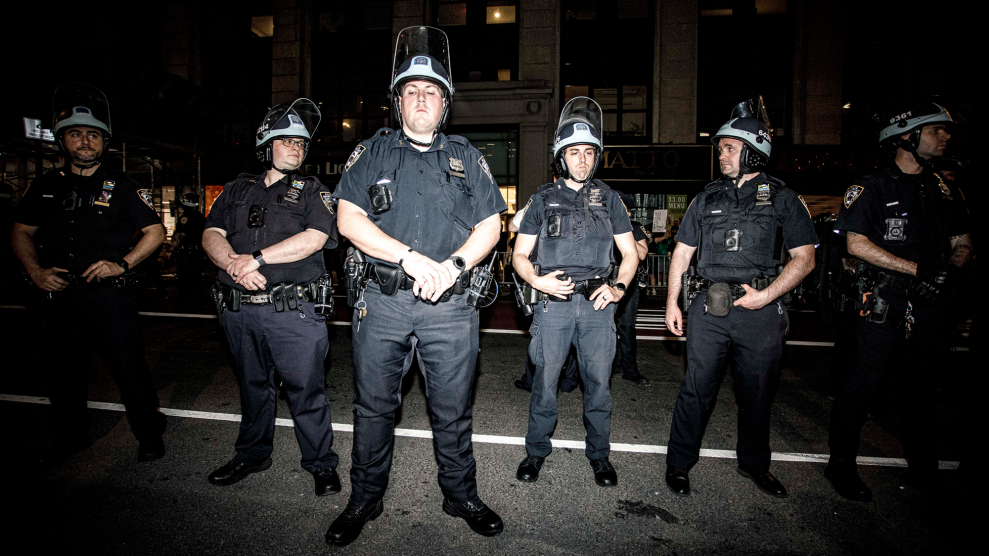Now Jay Bybee wants to explain his legal advice to members of Congress. Roll back the clock to February 2003, and Bybee’s stock answer to members of the Senate judiciary committee considering his nomination to the 9th Circuit Court of Appeals: “As the head of the Department’s Office of Legal Counsel, I am obligated to keep confidential the legal advice that my Office provides to others in the executive branch. I cannot comment on whether or not I have provided any advice on this matter, and, if so, the substance of that advice.” Asked about the opinions his office rendered on everything from the establishment of a Violence Against Women office in the Justice Department to the Pentagon’s use of data mining to the administration’s enemy combatant policies, Bybee refused, on more than 20 occasions, to provide any information.
Recently, Bybee has gotten a lot more talkative. And it’s no wonder why. There’s a mounting drumbeat to impeach him from the federal bench for his role in drafting memos that provided a legal rationale for harsh interrogation techniques that many believe amount to torture. Meanwhile, the Justice Department is finishing up an internal probe that may recommend disbarment proceedings—though likely not criminal prosecutions—against Bybee and ex-OLC official John Yoo. According to the Las Vegas Sun, Bybee has recently reached out to members of Nevada’s congressional delegation in order to “tell his side of the story.”
The step suggests that Bybee believes maintaining the judicial branch’s customary distance from the political process is no longer in his best interest.
Apparently Bybee determined—correctly—that remaining mum about his OLC work was the best way to go during the confirmation process. Though he met resistance from a handful of judiciary committee Democrats—Russ Feingold, Patrick Leahy, and Joe Biden, among them—he coasted easily onto the 9th Circuit. Opposing his nomination, Feingold said at the time:
…His unwillingness to provide information in response to our inquiries is striking. On more than 20 occasions, Mr. Bybee refused to answer a question, claiming over and over again that as an attorney in the Department of Justice he could not comment on any advice that he gave at any time.
Feingold also noted:
Without the OLC memos, important questions about how far the Government can go in the war on terrorism…and other important government issues do not just remain unanswered, they apparently remain off-limits.
At the time, Feingold and his Senate colleagues couldn’t have known just how far the Bush administration would push the envelope—the invasion of Iraq was still on the horizon, as were allegations about torture at Gitmo, Bagram, and elsewhere—but they certainly had cause to be wary. After all, administration lawyers had already devised a legal argument for exluding Al Qaeda and Taliban combatants from the protections of the Geneva Conventions. When then-Senator John Edwards asked Bybee about the OLC’s role in formulating the administration’s enemy combatant policy in 2003, the justice department lawyer gave his standard non-response response. And when Edwards inquired whether Bybee agreed with administration’s stance, he responded, “As a Member of the administration, it is my responsibility to support the President’s decision.”
Bybee’s present predicament puts one of his most powerful backers in a dicey situation. Along with his fellow Nevada Senator John Ensign, Harry Reid, now the Senate Majority Leader, sponsored Bybee’s nomination. During Bybee’s confirmation hearing, Reid heaped praise on the nominee, who he called “my friend.” Reid lauded Bybee’s “excellent legal qualifications” and “judicial philosophy” and said that “more important” than his impressive legal bonafides was “what a fine family man he is.”
Now that his friend may face consequences for his OLC reasoning, Reid is treading a careful line on how to handle the Bybee situation. The Senator has said he considers the interrogation tactics used by the administration—including waterboarding, which one of Bybee’s memos provided a legal justification for—to be torture. Yet Reid says he’s waiting for more information before weighing in on how the judge he helped install should be dealt with.
As Bybee attempts to salvage his career—his reputation may be beyond repair—he is certainly entitled to defend and explain the advice he provided to the Bush administration. (The memos he signed off on speak for themselves.) But had he done so in 2003, the outcome of his confirmation process may have turned out quite differently.


















